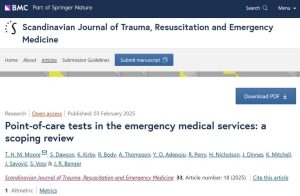Exploring the research on point-of-care testing in ambulances
10 February 2025
Testing patients in ambulance services can reduce transport of patients to hospital, reduce time to treatment and direct patients straight to specialist care. What types of point-of-care test have potential for this? A scoping review, published in the Scandinavian Journal of Trauma, Resuscitation and Emergency Medicine and involving NIHR ARC West researchers, has summarised the research so far and suggests future studies needed.
‘Point–of–care’ tests are used to diagnose health issues. They are done with the patient in the room and the rapid results allow medical staff to make quick decisions about the most appropriate care for the patient. Although there are many point-of-care tests already being used in emergency departments, hospitals and primary care, there is potential for them to be used more in ambulance services.
Performing these tests could help ambulance service paramedics:
- Start treatment sooner
- Advise and refer patients instead of travelling to hospital
- Direct patients to the right services as soon as they arrive at hospital
This could lead to:
- Better health outcomes for patients
- Better experiences for patients and staff
- Increased capacity and cost savings in the health system
The research team wanted to know which tests are effective, acceptable to patients and staff and likely to benefit the system.
The team included researchers from the Universities of the West of England, Bristol, Birmingham and Manchester and emergency care professionals. They looked at what point-of-care tests have been researched for use in ambulances and other emergency vehicles. They searched all research worldwide and categorised the tests and types of research. This informed discussions about what point-of-care tests could be investigated for use in UK emergency medical services.
The researchers searched three international clinical databases and found 141 relevant research papers. They identified 40 different wide-ranging point-of-care tests. These included tests to assess patients for poisoning, diabetes and seizures, but the majority were for sepsis, heart attack, critical illness or trauma. Most of the research was done in the UK, US and the Netherlands using 41 different test devices, taking place mostly in ambulances with a few in helicopters.
The purpose of most studies was to establish how accurate the test results were. Accuracy research is important, but three other types of research are also needed for policymakers to consider putting a point-of-care test into ambulance services. The researchers found very few studies:
- Looking at how the tests affected patients’ medical treatment and health outcomes
- Asking patients and paramedics’ opinions of the tests
- Counting the financial implications for the health system
They also found delays between initial interest in a point-of-care test use in ambulance services to publication of studies looking at its effects on patient care.
This work has identified considerable gaps in the research literature. It has also revealed a disconnect between existing research and the information needed to put point-of-care tests into ambulance services.
Based on their findings, the researchers recommend:
- Investment into funding and infrastructure to support research for point-of-care tests in ambulance services, as they are challenging to set up
- Emphasis on robustly-designed observational or randomised studies to assess the effects of point-of-care tests on patient outcomes
- Investigating the impact of the tests on the health system, and their cost effectiveness
- Finding out how patients, carers and paramedics feel about the tests
This would provide the evidence policymakers need to make decisions about how to implement this type of testing in ambulances.
Dr Kim Kirby, Senior Research Fellow Paramedic Science at the University of the West of England, said:
“Ambulance service staff operate in an unpredictable and complex setting. This scoping review has been really important to understand the gaps in the existing evidence.
“It has usefully highlighted the requirement for more research to understand which tests are suitable for ambulance services, how they might impact the patient pathway and any financial impacts for the NHS.”
This research was led by NIHR ARC West, NIHR Birmingham Biomedical Research Centre, the Universities of the West of England, Bristol, Manchester and Birmingham, South Western Ambulance Service NHS Foundation Trust, Manchester University NHS Foundation Trust and Gloucestershire NHS Foundation Trust.
Paper
